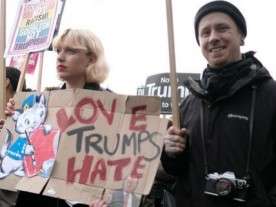Do Crimes Against Immigrants Deserve More Attention?
The coverage of recent shootings of Indian Americans was muted compared to terrorist attacks
My 20-something nephew from India is thinking of canceling his planned summer trip to the U.S. because, as he explained to me, "of all the Indians getting killed in America."

He was referring to the three recent shootings — two fatal — of Indians in America. The first one, in Kansas, involved a white army veteran, Adam Purinton, who allegedly opened fire on two Indian tech workers in a bar, killing one and injuring another, while shouting, "Go back to your country." The second shooting involved a Sikh man in a Seattle suburb who was injured in his driveway after a gunman opened fire, allegedly yelling the same thing. And in the third case, a South Carolina Speedie Mart owner who'd been in the country for 14 years was gunned down outside his house. The motive is still unclear.
The wall-to-wall coverage of these incidents in the Indian press has spooked Indians, even leading to calls that the Indian government issue a travel advisory for America. Social media and newspapers have issued purple condemnations of President Trump's anti-immigrant rhetoric, which many Indians assume to be driving the spate of killings. "Long years of struggle lie ahead, for the damage Trump has inflicted on the United States' most cherished values will, almost certainly, outlast his years in office," lamented an editorial by the Indian Express, one of the nation's biggest publications.
Meanwhile, the coverage in American papers has been relatively muted.
India's blanket coverage is irrational, but understandable. America's apparent blissful ignorance is rational but less understandable.
National hate crime data is notoriously unreliable. The Southern Poverty Law Center's stats, which are cited frequently, use a rather elastic definition of hate crimes, and are little more than a loose collection of anecdotes culled from media accounts and subjective self reports. The FBI dataset, which is based on a more objective metric of "prosecutable" hate crimes, depends on voluntary reports by local police departments and hence is hopelessly incomplete. Still, after many years of decline, the FBI registered a 6.8 percent uptick in hate crimes in 2015, the last year for which data is available. A bit more than half of these attacks were racially motivated against blacks. Meanwhile, crimes against Muslims spiked by 67 percent — although they still constitute a small percentage of the total. Hate crimes against Asians were just 3.3 percent of the total.
Even if it turns out that these numbers have gone up significantly since President Trump's election, it would still likely be the case that Indian Americans (and other minorities), on the whole, are less likely to be targeted by a fellow American than, say, Muslims are by fellow Indians in majority-Hindu India. And Muslims in India are less likely to be targeted than Hindus in majority-Muslim Pakistan (all of which I pointed out to my nephew!).
A country's record of protecting its minorities gets better as we move farther across the liberal democracy continuum.
But people don't form their threat perception through statistics and data. After just one terrorist attack on 9/11, America launched a 17-year-and-still-counting war on terrorism, invaded countries and toppled regimes, spent trillions of dollars in homeland security, and subjected travelers — domestic and international — to onerous TSA checks for a minuscule increase in safety given that the odds of an American getting killed by a terrorist attack are already lower than getting struck by lightning.
But Indian Americans, like other people of color who look remotely like they may be Muslim, face a triple threat: They face the same odds as other Americans of being targeted in a terrorist attack. In addition, they are vulnerable to hate crimes (post-9/11, there was a definite spike in attacks against Indian Americans, especially Sikhs, who wear a turban). And they experience racial profiling by authorities. (I usually have my white American husband in the driver's seat for the border stop when we drive from Detroit, near where we live, to Canada, to lower the odds of a full car inspection) So it is understandable that the Indian press — given the large diaspora in America — should follow the plight of Indian Americans closely.
The question is why hasn't the American press devoted more attention to these shootings? The vast majority of Americans probably don't even know about these attacks.
At first blush, maybe this makes sense. A few killings — one of which may have been a random act — don't a newsworthy pattern make. But as Barkha Dutt, a popular news anchor in India asked in The Washington Post, would Americans have reacted with the same nonchalance if the perpetrator wasn't a white guy named Adam but a Muslim named Akbar? And instead of yelling "Get out of my country" he had chanted Allah hu Akbar? Furthermore, what if the victim had been a white (or black) American rather than an Indian American with an unpronounceable name? "Can you imagine the hell that would have broken loose?"
America's political scheme counts on a robust press – not censorship -- to counter incendiary political rhetoric, even by high officials who ought to know better. Hence such incidents are teachable moments to keep the forces of vitriol from growing. In this case, it would have been useful in showing that all brown people are not Muslims (and not all Muslims are terrorists). If the press must err, it is on the side of more coverage, not less. It is regrettable that in this case the American press fell on the job.
A version of this column originally appeared in The Week
